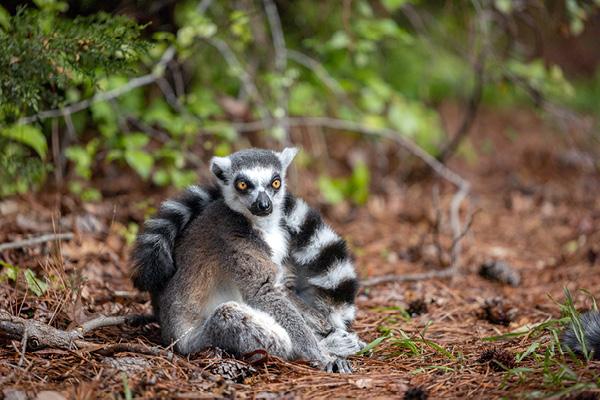
At the Duke Lemur Center, every lemur receives meticulous care as part of a comprehensive preventative health program. Griselda, an endangered ring-tailed lemur born with her twin sister in 2016, is no exception. During a routine exam under anesthesia, it became evident that Griselda needed specialized attention from Dr. Matthew Ellison, an otolaryngologist and head and neck surgeon at Duke Health.
Lemurs are primates and are therefore anatomically very closely related to humans. The Duke Lemur Center’s preventative exams are thorough, encompassing physical exams, imaging (such as whole-body and dental radiographs, and abdominal ultrasounds), laboratory analyses (including bloodwork, urinalysis, and fecal exams), dental prophylaxis, body condition scoring, vaccinations, and routine TB testing.
Despite being a generally happy and healthy lemur, Griselda has experienced intermittent sneezing and nasal discharge since she was about four months old. These symptoms occasionally escalated to lower airway disease, including pneumonia. In 2023, a collaborative effort between veterinary specialists from North Carolina State University’s College of Veterinary Medicine and the Duke Lemur Center led to a sinus trephination procedure. This procedure, aimed at draining and flushing Griselda’s maxillary sinuses, was informed by 3D-reconstructed CT scan images provided by an evolutionary anatomist at the Duke Lemur Center’s Museum of Natural History.
These images not only guided the trephination procedure but also helped identify anatomical changes that might have contributed to Griselda’s condition. While the exact cause of her congenital or developmental abnormalities remains unclear, the trephination has been beneficial. However, persistent fluid and infection in her ears prompted the Duke Lemur Center to seek Dr. Ellison’s expertise.
Dr. Ellison’s examination, conducted while Griselda was under anesthesia, included a thorough inspection of her ears and flexible rhinoscopy to assess her nasal passages. He found no active infection or inflammation in her ears but noted tissue remodeling due to chronic inflammation in her nasal passages. Dr. Ellison agreed that the current treatment and monitoring plan was appropriate, and ear tubes were not recommended at this time. Should ear tubes be considered in the future, Griselda would need to be trained to accept post-operative ear drops with the help of her personal caretaker.
Following Dr. Ellison’s visit, Griselda continues to actively participate in her own healthcare. Trained by her primary caretaker, she willingly accepts nebulization therapy, which encourages her sinuses and nasal passages to drain properly. Griselda is closely monitored for any new clinical signs.
The Duke Lemur Center is recognized as a global authority on lemur veterinary medicine. The veterinary team includes a Board Certified Specialist in Zoological Medicine™ and a veterinarian trained in laboratory animal medicine, as well as two registered veterinary technicians. Together, they ensure the well-being of all 230+ lemurs living onsite and support non-invasive research at the Center. The team members are Julie Ter Beest, MS, DVM, Dipl. ACZM, Brendan Johnson, DVM, PhD, Catherine Ostrowski, RVT, and Chrissy Conrad, RVT.
Occasionally, the Duke Lemur Center partners with human doctors to provide the best possible care for their lemurs. With Dr. Ellison now on call, Griselda and her fellow lemurs can continue to receive the specialized care they need.